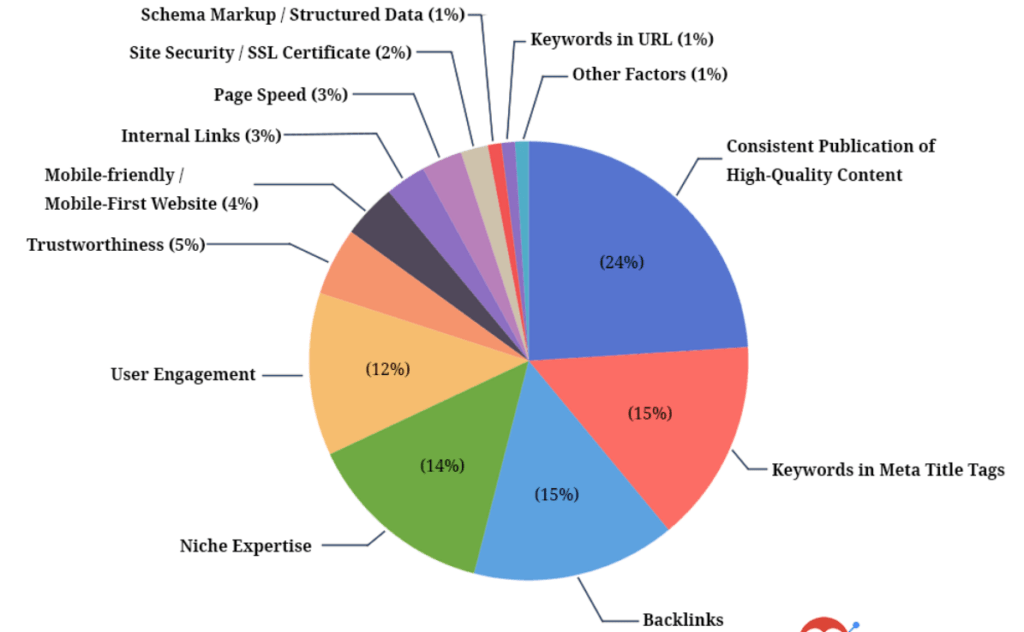
SEO Ranking Algorithm which we have to keep in mind while doing SEO.
When it comes to SEO Ranking Algorithms there are a number of algorithms that you should keep in mind in order to rank your website. Here are a few of the most important ones:
Google Search Algorithm: This is the most important algorithm to consider when it comes to SEO Ranking Algorithm, as Google is the most popular search engine in the world. Google uses a complex algorithm to determine which websites rank higher in the search results based on a variety of factors, including keywords, backlinks, and user experience.
RankBrain: RankBrain is a machine learning algorithm that helps Google determine the relevance and quality of a webpage. It uses artificial intelligence to understand the intent behind a search query and provide the most relevant results.
Panda: The Panda algorithm is designed to penalize websites with low-quality content or content that has been copied from other websites. To rank well in search results, it’s important to have high-quality, original content on your website.
Penguin: The Penguin algorithm focuses on backlinks, penalizing websites with low-quality or spammy backlinks. To rank well, it’s important to have high-quality backlinks from reputable websites.
Hummingbird: The Hummingbird algorithm focuses on semantic search, which means it tries to understand the meaning behind a search query rather than just matching keywords. To rank well, it’s important to focus on creating content that answers the questions your target audience is asking.
Mobile-first indexing: Google now uses mobile-first indexing, which means it prioritizes the mobile version of your website over the desktop version. To rank well, it’s important to have a mobile-friendly website that loads quickly and provides a good user experience on mobile devices.
E-A-T: E-A-T stands for Expertise, Authoritativeness, and Trustworthiness. Google has emphasized the importance of E-A-T in recent years, particularly for websites that deal with SEO Ranking Algorithms on sensitive topics like health, finance, and news. To rank well, it’s important to establish your expertise, authoritativeness, and trustworthiness through high-quality content, expert opinions, and citations from reputable sources.
BERT: BERT stands for Bidirectional Encoder Representations from Transformers. It is a natural language processing algorithm that helps Google understand the context and nuances of a search query. To rank well, it’s important to focus on creating content that answers specific questions and provides valuable information to users.
Pigeon: Pigeon is a local search algorithm that affects local businesses. It focuses on providing relevant and accurate results for local queries, such as “restaurants near me” or “plumbers in my area.” To rank well, it’s important to have a well-optimized Google My Business listing, consistent NAP (Name, Address, Phone) information across the web, and positive reviews from customers.
Core Web Vitals: Core Web Vitals are a set of metrics that measure the user experience of a website, including page loading speed, interactivity, and visual stability. Google has announced that Core Web Vitals will be a ranking factor starting in May 2021. To rank well, it’s important to ensure that your website meets the minimum standards for Core Web Vitals.
PageRank: PageRank is a link analysis algorithm that was developed by Google co-founder Larry Page. Although PageRank is no longer the primary ranking factor for Google, it is still a valuable metric for evaluating the quality and authority of a website. To rank well, it’s important to have high-quality backlinks from reputable websites. These SEO Ranking Algorithms are just some of the many factors that can affect your website’s SEO performance. By understanding these algorithms and optimizing your website accordingly, you can improve your chances of ranking well in the search results and driving more traffic to your site.
| FACTORS | |
| Consistent Publication of Engaging Content | 24%▼ |
| Keywords in Meta Title Tags | 15%▼ |
| Backlinks | 15% |
| Niche Expertise | 14%▲ |
| User Engagement | 12%▲ |
| Trustworthiness | 5% NEW |
| Mobile-Friendly / Mobile-First Website | 4% |
| Internal Links | 3% ▼ |
| Page Speed | 3% |
| Site Security / SSL Certificate | 2% |
| Schema Markup / Structured Data | 1% |
| Keywords in URL | 1% |
| Keywords in Meta Description Tags + 19 Other Factors | 1% |
